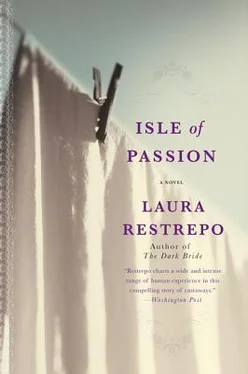The rest of the world no longer existed for her. She did not see, hear, or understand; she did not touch the food prepared for her. She was not even aware of Ramoncito’s presence as he clambered upon her shoulders, pulled her by the arms, and fluttered around her, constantly talking to her.
“Mom, look at this conch. Mom, it hurts here. Mom? Can I tell you a story? Mom, I saw Daddy a while ago. Could I make a necklace for you, Mom, with this shell?”
Alicia did not respond. She had drifted far away without wanting to return. The child caught a crab and began playing with it. It had fiery pop eyes, and a red shell with white dots. It would open and close its pincers and had hair on its legs and antennae on its head. In an attempt to escape, it ran backward, sideways. Ramoncito blocked its way with a log. He pricked it with a stick and harassed it with his foot.
“Mom? Look at this sea monster, Mom.”
The animal suffered, got angry, went mad; it was fascinating in its desperation. The child got his face closer to see it better.
His screaming and his bloodied face pulled Alicia from the bottomless pit of her loneliness. The crab had bitten Ramoncito on the lip, parting it in two. She picked up the child and ran home with him in her arms.
“Did you see, Mom? The sea monster got furious.”
She hugged him, kissed his hair and his eyes, asked him for forgiveness.
“I’m sorry, my son, I’m sorry. Forgive me, it was my fault, I am to blame, mea culpa, mea culpa, mea maxima culpa.”
Back at home, Alicia cleaned the wound, took out her sewing basket from the trunk where she kept her valuables, and threaded a needle with the last strong, long blue strand left.
“Where is Tirsa?” she asked Altagracia.
“She’s not nearby, ma’am. Do you want me to go get her?”
“There is no time. Alta, hold the child.”
Alicia took a deep breath, controlling the tremor in her hands, and summoning a courage she did not have, she started to sew the wound, stitch by stitch, with the needle and the blue thread. When she finished, she lay the child on his bed and kept caressing his head until he fell asleep. Then she called the other women. The five came: Tirsa, Altagracia, Benita Pérez (Private Arnulfo Pérez’s widow), Francisca (who was Pedrito Carvajal’s girlfriend), and Rosalía (who belonged to all and to no one in particular). Alicia glanced at them — they were all disheveled, undernourished, dressed in rags — and she thought they looked ten years older than they actually were. I must look like this, too, she thought. Like a witch. If Ramón had returned then, he would have been scared to death. She asked the women to sit down and hear her out.
“The men here have died, but we are still alive. The children are alive, and we have to feed them. It’s not going to be easy. We must work hard, so the mourning period is over. We must stop crying for our husbands because we have to take care of our children.”
As a result of this meeting, the first one headed by Alicia, the wearing of skirts was forbidden.
“No rags to get in the way,” she said. “And we must learn how to fish.”
She distributed the pairs of pants left by the men. Cutting them above the knee, they cinched them around their smaller waists with hemp. All had been living on the isle for seven years but had not learned how to fish: to provide food had been solely a male endeavor. From that day, come early dawn, they were working by the ocean, setting traps among the corals, and toiling with nets, fishing poles, and hooks. They hurled sharp sticks at anything that moved underwater. Hours later they would lie on the beach, enervated from overexposure to the Clipperton sun, completely exhausted and demoralized after so much fruitless effort. The first week they went hungry; they caught only a couple of eels, an octopus, and a small ray.
The discovery of an easier way to fish came to the children. One day when the women returned from the seaside empty-handed, they found the children sitting around a half-dozen sardines still alive and flapping.
“Who gave those to you?”
“Nobody. We took them away from the birds.”
They saw how the children, golden and supple, disbanded and rushed to the beach. When a booby darted into the water and got a fish in its beak, the children zigzagged after it, prancing around, and then lunged forward to grab the bird and shake it by the legs until it let go of its catch. The children came back bursting with pride, shiny fish in hand. The women laughed — it was cute to see them run, and funny to watch them shaking the ugly birds — and then tried to imitate the children but couldn’t, lacking their agility. Alicia and Francisca ran after one bird, got entangled with each other, and fell to the ground. The bird started to fly away. Alicia managed to stand up, lunged, and, still holding on to a few feathers, fell again. Lying down and with the children shouting and clapping around her, she understood what a minute before would have seemed inconceivable to her. She realized that, in spite of everything, she could still feel happy. She felt ashamed of herself on account of Ramón, got up quickly, and shook the sand off her hair. That night the women lit a bonfire by the seashore and roasted more fish than they could eat.
In time, they perfected other practical ways of fishing. The most effective was to lie facedown at the dock with a sharp stick ready, and then wait until a big fish came around looking for shelter underneath. It was easy to mount a surprise harpoon attack through the broken deck boards. With this method they obtained sawfish, sea bass, tiger fish, and moonfish. Alicia regained her role as a schoolteacher, and the children and the rest of the women had to attend her classes daily. For paper and pencil, they wrote on the sand with sticks. Since all the books had been lost, the readers used were the accounting records of the guano company and some old newspaper clippings about the invasion of Veracruz. They conjugated verbs in English and in French, and learned religion, good manners, and civics.
Long ago, Ramón had solved the lack of a calendar by carving lines on the veranda of their house. After his death, Alicia completely forgot to mark the days. Now she wanted to keep track, but she had no clear notion of how much time had elapsed. She thought it was about a month and Tirsa believed it was only twenty-five days. So they compromised, and marked twenty-eight lines.
“I have no idea what day is today in the rest of the world,” Alicia declared, “but here it is Tuesday, June 24, 1915.”
Between teaching, taking care of the children, and the intense, indispensable survival activities, they managed one day at a time, without the leisure of wondering about the days gone by or the days to come. In that way, without realizing it, they overcame the nightmare in which they were living and made it bearable.
All that was during the day. But when night fell, their fears and sorrows came back to overwhelm them. The children were so frightened that they clung to the women and would not fall asleep unless cuddled in their arms. In spite of being so tired, the women could not sleep either. In the dark, memories weighed so heavily that the past became present, and the dead returned, first one and then another, until they filled the house, and those still alive had to nestle in the corners to make room for them.
The moans of the flagellants were heard again, and the cries of Irra’s young sons, struck down by scurvy. Jesús Neri would appear, bitten by sharks, together with Juana, his wife, smelling horrible. Some of the visits were pleasant, like those of Ramón and Cardona, who would talk about their own death. Their voices came out of the dark as in the old happy times when they gathered at dusk.
Читать дальше












